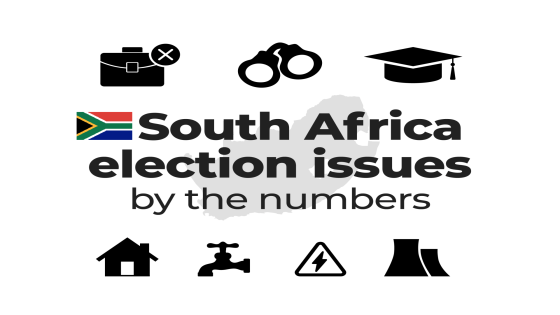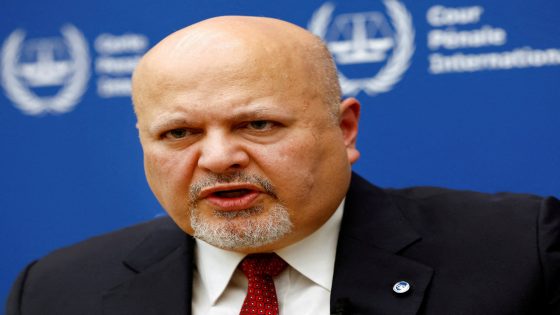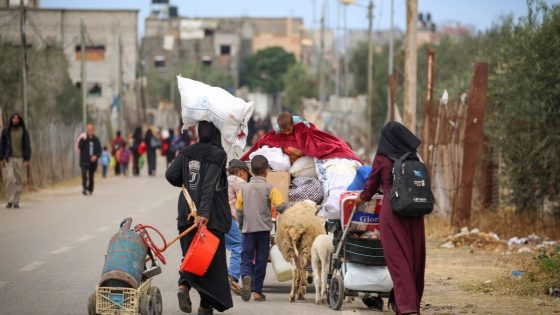South Africa will go to the polls on May 29 for the most unpredictable election in the country’s 30 years of democratic rule.
The governing African National Congress (ANC) is projected to lose its parliament majority for the first time, possibly paving the way for the country’s first coalition government.
With voter discontent high, leading opposition parties, including the Democratic Alliance (DA), the Economic Freedom Fighters (EFF), and newcomer umKhonto we Sizwe (MK) have put pressure on the ANC in online campaigns and countrywide rallies, promising sweeping reforms in hopes of swaying some 28 million registered voters to their side.
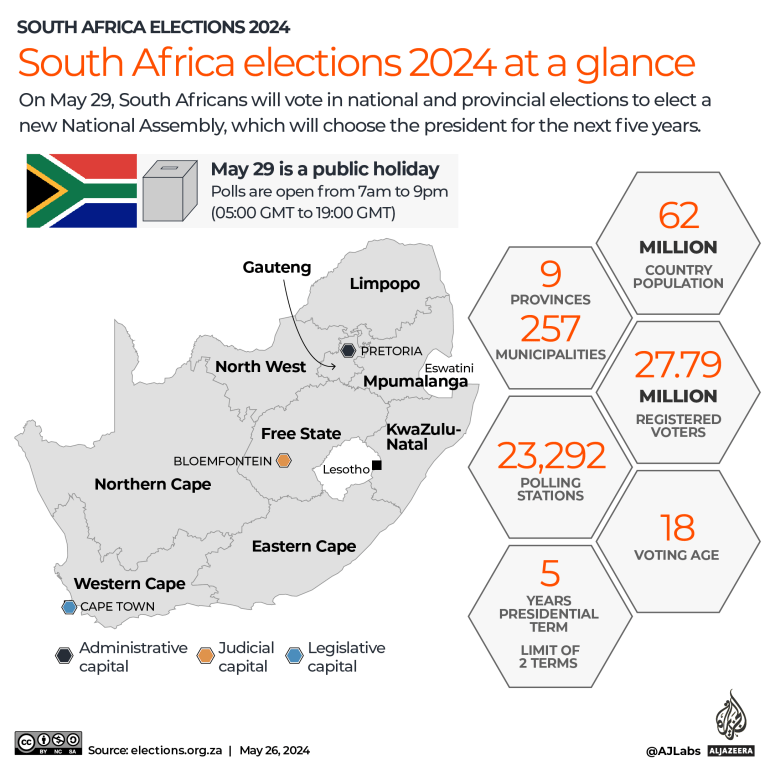
Young people constitute a key demographic, making up a bulk of the electorate. They are also the most removed from South Africa’s apartheid past, to which the ANC’s legacy as the party of liberation is closely tied.
Voting will be held across the country’s nine provinces, where people will cast ballots for national and provincial governments.
Here are the key issues that are top of mind for the majority of voters:
Jobs: One in three South Africans unemployed
The country has the highest unemployment rate in the world. For young people who have diplomas but find their education of no use, unemployment is the biggest issue on the ballot.
Analysts say poor industrialisation in the decades of ANC rule means Africa’s most advanced economy has failed to create jobs for its bulging youth population.
General unemployment rates rose slightly late last year from 31 percent to 33 percent during the first quarter of 2024.
The problem is particularly poignant among the country’s youth, aged 15-34. Unemployment in this group stands at 45.5 percent, higher than the national average.
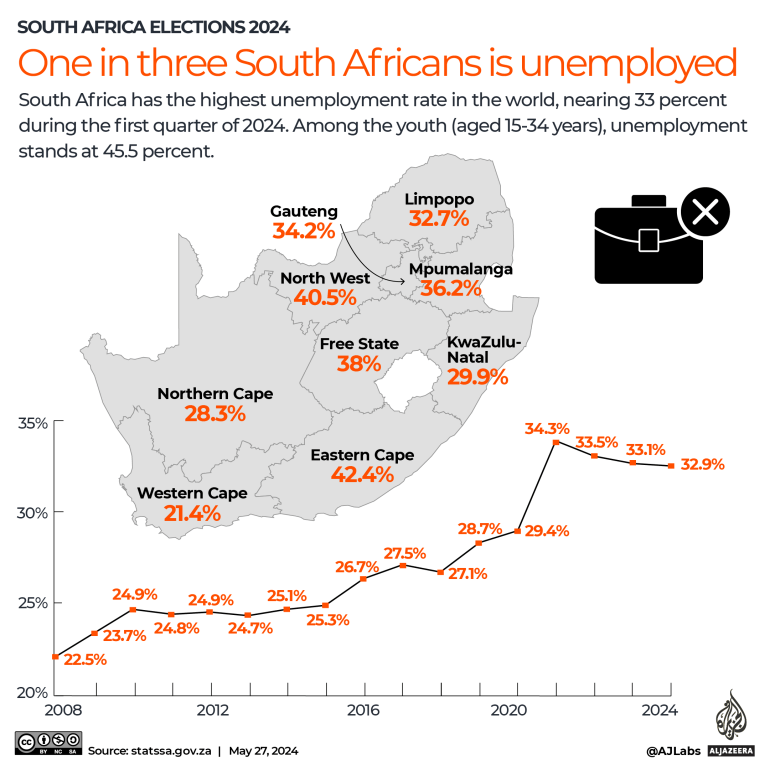
By province, the Eastern Cape – known for being Nelson Mandela’s homeland, housing the city of Gqeberha, previously named Port Elizabeth, and being the poorest of all nine provinces – has the highest levels of unemployment at 42.4 percent. The North West province trails closely at 40.5 percent and the Free State at 38 percent.
On the other hand, the Western Cape, the home turf of the opposition DA party and where the city of Cape Town is located, has the country’s lowest unemployment levels at 21.4 percent, followed by the Northern Cape at 28.3 percent and KwaZulu-Natal at 29.9 percent.
Education and employment: Lingering inequalities
Historical inequalities continue to rack South Africa’s education sector, creating negative feedback in the employment sector.
Although schools were desegregated before the end of apartheid, Black-majority communities still have largely underfunded public schools with inadequate amenities like libraries and laboratories. Some do not have basic facilities like the internet and lack qualified teachers.
On the whole, the Black population has higher numbers of people who do not have any kind of education. Among white South Africans, however, a higher percentage are more likely to have attained a tertiary level education – three times the numbers seen in Black people, Indians, or mixed or multiracial communities.
Researchers say the lower levels of tertiary qualification in general are connected to lower skill levels and to the type of jobs people are qualified for. While 9.6 percent of people with a graduate degree are unemployed, the number more than quadruples for those who did not complete high school.
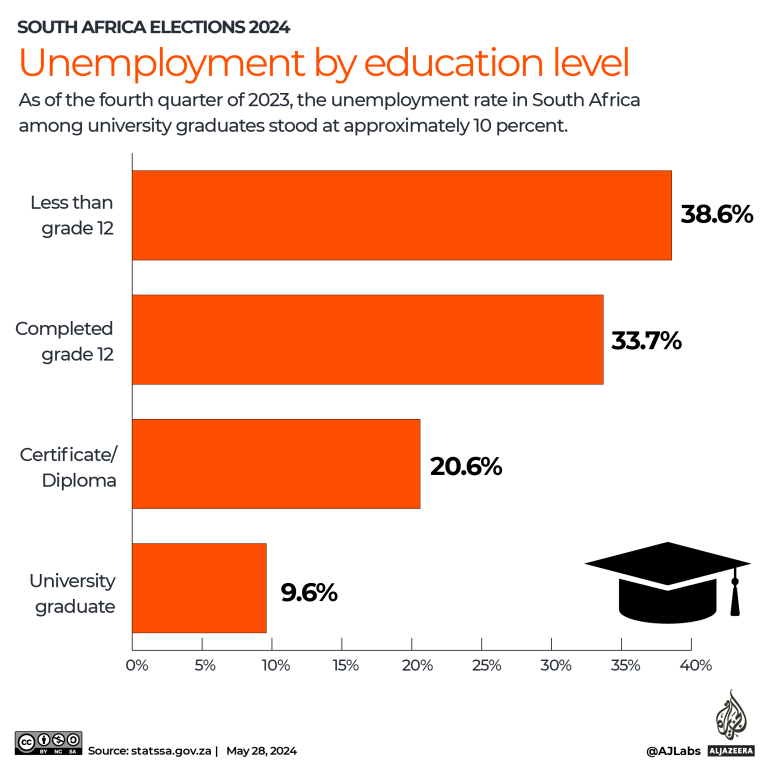
Other findings also point to the fact that school curriculums are not preparing young people for the job market as they are not aligned with employer needs. The results are a glaring skills and job mismatch: a 2019 report from the Boston Consulting Group, for one, found that there is a 50 percent mismatch between skills demanded and supplied in South Africa, contributing to a low-productivity workforce.
Crime: Rising and worsening
High levels of poverty, unemployment and inequality have led to increased violent crime in South Africa, worsened by the rise of organised criminal groups.
According to the South African Police Service’s annual crime report (PDF), during the 2022-23 financial year, 1.8 million counts of serious and violent crimes were reported across the country, an increase of 7.7 percent from the year before.
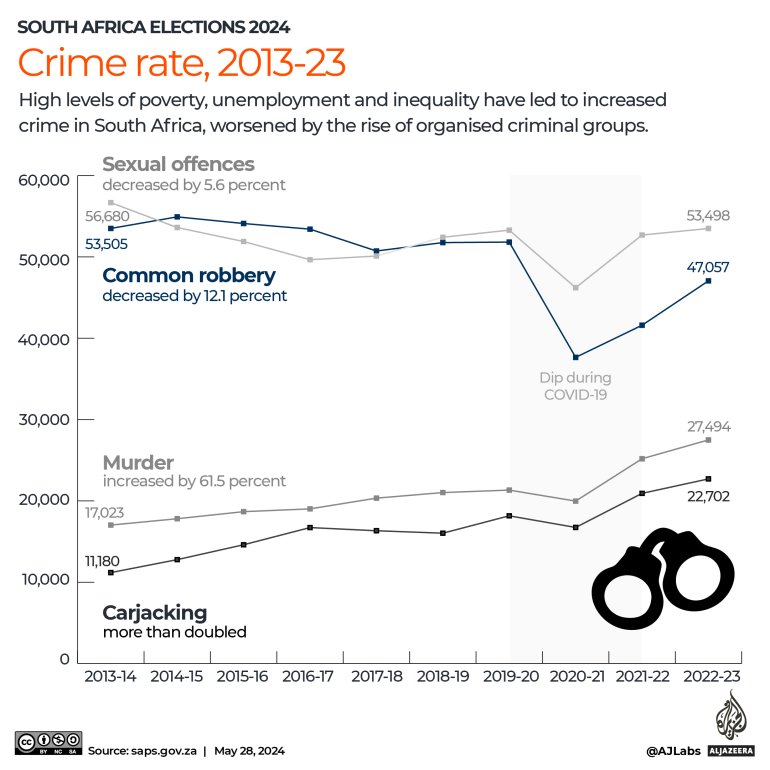
On average, 75 people are murdered every day, an increase of some 60 percent over the past 10 years.
Carjackings have more than doubled over the past 10 years from an average of 31 incidents per day in 2013 to 62 cases reported in 2023.
On the flip side, common robbery reports dipped by 12 percent over the past 10 years and sexual offence crimes, including rape and sexual assault, decreased by 5.6 percent over the same period.
Housing: Millions still live in shacks
Housing is a sore topic in South Africa, where the minority white population has traditionally owned the majority of the land. It is one of the most visible examples of the stark mismatches that contribute to South Africa being labelled as one of the world’s most unequal countries.
Although approximately eight in 10 South Africans (83.2 percent) live in formal homes, at least 2.2 million people still live in informal dwellings, including shacks built out of corrugated iron sheets or other scrap material.
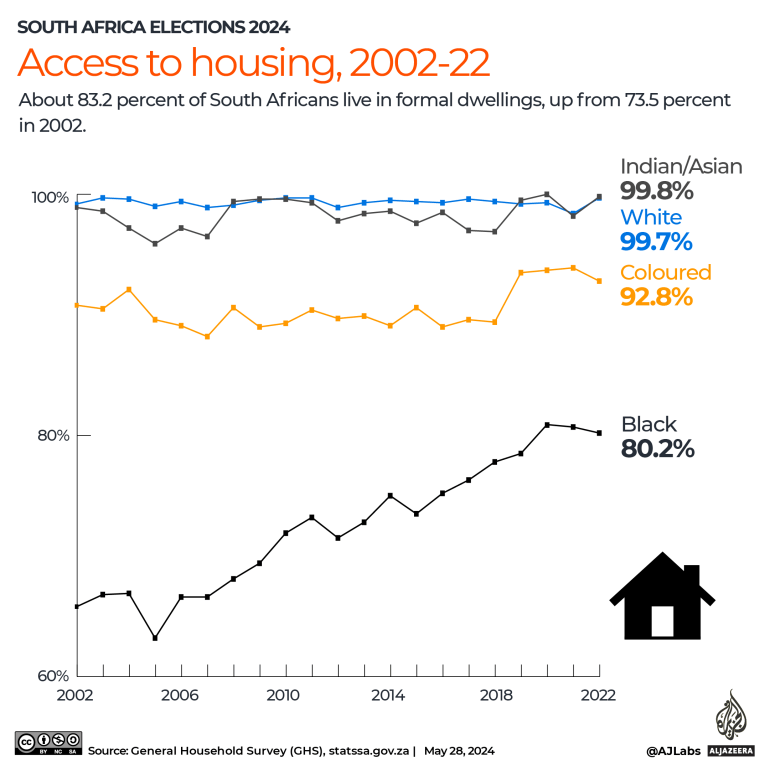
Black South Africans, who make up about 80 percent of the population, are disproportionately affected. Under apartheid rule, Black people were dispossessed of their land and forced into “bantustans” (homelands) or crowded slums and hostels, where many died of diseases from the poor conditions there. Although Black people are no longer legally bound to live in such conditions, many remain stuck in inadequate and informal housing.
Land reform was a major principle of the ANC in the fight to end apartheid, but efforts to redistribute land and provide affordable housing to the millions in need continue to fall short three decades later.
Basic services: Unequal access
South Africa is generally water-stressed. The country is highly susceptible to drought from low-average rainfall and a hot climate. Add to that, poor management and unequal distribution of water have meant that access to this crucial resource also varies according to race.
More than 80 percent of South African homes have access to piped water but cuts are regular in some parts, like Limpopo and Mpumalanga provinces. Across the country, it is not uncommon to see homes in wealthy neighbourhoods with clean swimming pools, while in nearby townships, Black people queue at communal water points with their plastic buckets and containers to collect water and then trek home.
Potable water is generally accessible, but not guaranteed for all. According to government data, white, mixed-race and Indian communities have the highest access to safe water – all above 94 percent. In Black homes, the number falls to 86.7 percent.
While electricity access is largely available in both rural and urban areas, the country’s reliance on failing coal-fired power plants has meant electricity supply – for all – has plummeted sharply in recent years.
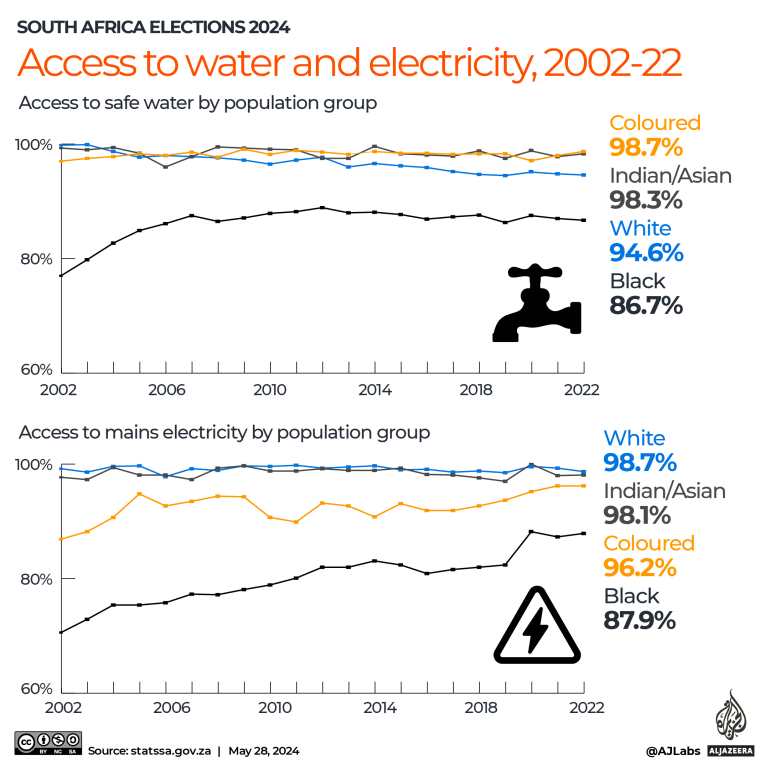
‘Load shedding’: An ongoing crisis
Eskom, the state-owned electricity provider, has implemented regular power cuts for years to manage the growing demand for energy and prevent grid collapse. The ongoing blackouts are locally referred to as “load shedding”.
In 2023, Eskom, plagued by corruption and mismanagement, imposed record-breaking power cuts totalling 6,947 hours, equivalent to 289 days, resulting in rolling blackouts of about six to 12 hours per day across the country.
The South African Reserve Bank says these power outages cost the economy about 900 million rand ($50m) per day in losses to factories and businesses.
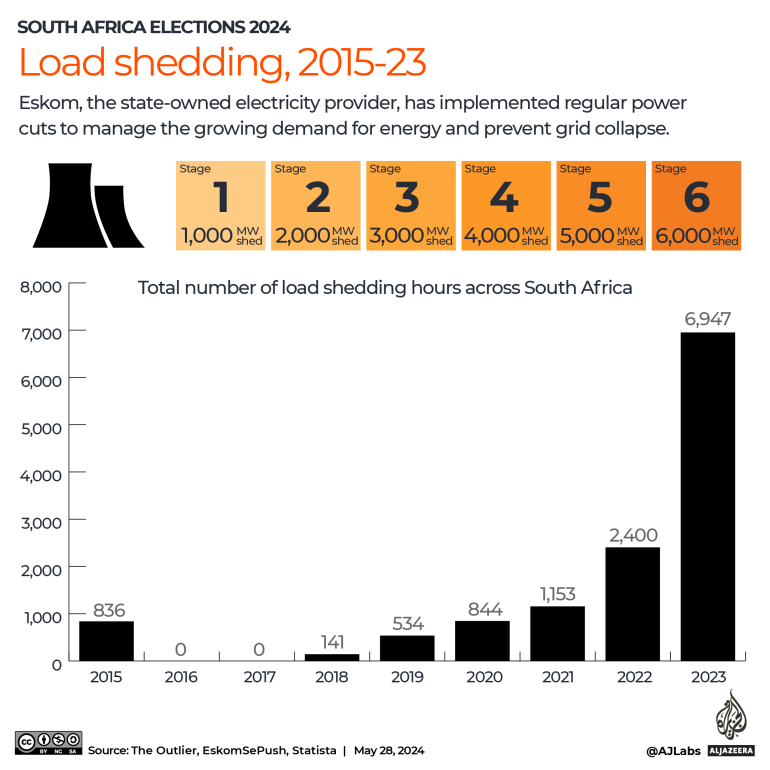
For the past two months, South Africans have enjoyed an uninterrupted electricity supply, marking the longest period without power cuts since 2022. This has led the opposition DA and others to accuse the ANC of playing a power game to win supporters ahead of the election.
The ANC has denied this, with President Cyril Ramaphosa saying in an interview with local radio station 702 that his government has been working with Eskom to revamp and maintain South Africa’s power stations on a programmed basis.
